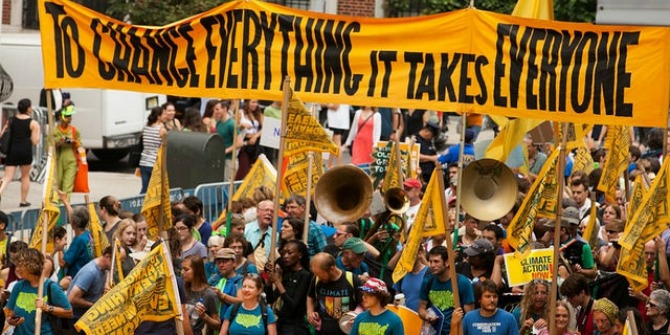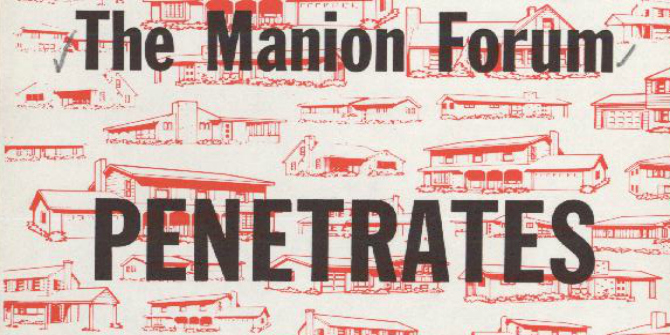In Foreign Pressure and the Politics of Autocratic Survival, authors Abel Escribà-Folch and Joseph Wright proceed from the belief that democratisation is desirable to examine the effects of various foreign policy approaches on the resilience of autocratic rule. While Max Budra suggests that some of the findings will be familiar to students and scholars working in democracy studies, he nonetheless welcomes the book for providing a framework through which to distinguish between different autocratic regimes.
Foreign Pressure and the Politics of Autocratic Survival. Abel Escribà-Folch and Joseph Wright. Oxford University Press. 2015.
 Thus Always to Tyrants
Thus Always to Tyrants
In late 2011 Muammar Gaddafi, the dictator of Libya, was killed. Gaddafi was arguably the most striking casualty of a democratic upheaval that would become named as the Arab Spring. Tunisia’s Zine El Abidine Ben Ali was forced to flee into exile; Yemen’s Ali Abdullah Saleh to resign; and Egypt’s Hosni Mubarak was put on trial. At the time of writing, Syria is wracked by a civil war that has transformed into something far worse.
Dictatorships, as the saying may go, are stable until they aren’t. The Soviet Union lasted for nearly seventy years before collapsing, seemingly overnight. The autocrat casualties of the Arab Spring were all long-reigning. In the wake of this last wave of democratic upheaval, two academics, Abel Escribà-Folch and Joseph Wright, have co-authored a book on how the outside world can help give autocracies the final push they need to democratise, called simply Foreign Pressure and the Politics of Autocratic Survival. The book takes as its starting point the belief that democratisation is desirable, and provides a thorough examination of the effects of various foreign policy tools on differing types of autocracies. The end result is an informative, if perhaps not exactly surprising, account of how autocracies can be induced to democratise.
While Escribà-Folch teaches at Universitat Pompeu Fabra, Spain, stylistically the book is every bit a product of Wright’s country: that is to say, it is clearly a work of contemporary US comparative political science. Statistics, graphs, formulae and variables abound; the choices of dictators are simplified into games. When their rule is threatened, their first choice is between repression and stepping down, and the binary choices continue from there. The drama of revolution, with the embattled dictator in his palace, the citizens baying for freedom in the street and the conflicted soldiers in their barracks, is condensed into the straight lines of a decision tree. The effect is rather amusing.
The authors’ key insight, however, comes early. Instead of lumping all autocracies into one catch-all category, they divide them into three: party, personalist and military regimes. Examples of these categories would be post-Mao China, Gaddafi’s Libya and Chile under Pinochet, respectively. Yet it is disappointing that the authors did not include monarchies in their three types of autocracies as it is unclear where such regimes might fit in the existing categories.
 Image Credit: US Secretary of State Henry Kissinger Shaking Hands with Augusto Pinochet in 1976 (Wikipedia Public Domain)
Image Credit: US Secretary of State Henry Kissinger Shaking Hands with Augusto Pinochet in 1976 (Wikipedia Public Domain)
This initial categorisation does allow for a range of insights. Firstly, it opens up the question of how different types of autocratic regimes perpetuate their reigns. These strategies are also divided into three categories: patronage (the favoured tool of personalist regimes); institutionalisation (favoured by party regimes); and repression (favoured by military rules). To their great credit, the authors make no mention of the patronising notion of ‘democratic culture’, an idea that dates back to at least John Stuart Mill and holds that certain peoples are simply incapable of engaging in democracy. Echoes of this concept can still be found in phrases such as ‘Asian values’, and in the apologies given for the autocracies of the Middle East.
Once the different types of regime and their survival methods have been identified, the book moves on to the crux of its analysis: an examination of the different tools with which foreign states can induce autocracies to democratise. ‘Democratise’ is the key word. Some tools may destabilise existing autocracies, but they also pave the way for them to be replaced with another autocracy. There are five such tools, each of which gets its own chapter complete with a statistical analysis and an illustrative historical example. The tools are, in the order the book uses: foreign aid conditionality; economic sanctions; ‘naming and shaming’; human rights prosecutions; and military interventions. As one might expect given the structure of the book thus far, these tools are found to have differing effects on the different types of autocracies, affecting each type’s favoured method of staying in power.
Briefly, the authors find that foreign aid conditionality is most effective against party regimes as it weakens their fiscal ability to maintain a base of support. Economic sanctions, meanwhile, are found to be most effective against personalist regimes. However, as the authors note, since sanctions weaken the ability of dictators to rule by patronage, they force them to instead rely on repression. ‘Naming and shaming’, which is to say human rights awareness campaigns, are found to be most effective against military regimes as these tend to be the successors of democratic regimes, and thus rule countries with a history of democratic norms to which such campaigns can appeal. All these tools, however, are found to be limited in their effects.
The penultimate chapter is the most nuanced. When it comes to human rights prosecutions, the authors cleverly distinguish between regimes that have deep institutional roots and which can thus protect dictators once they step down (think of Saleh’s Yemen), and regimes that offer no such hope of post-democratisation protection (Gaddafi’s Libya). While the threat of prosecution may raise the initial cost of a dictator’s decision to rely on repression rather than step down, once that choice has been made the dictator will be far less likely to surrender.
The final chapter on tools of democratisation explores the use of military intervention. The analysis yields little that is surprising. Broadly speaking, there is a distinct paucity of cases in which military interventions have actually democratised a state.
That, perhaps, is the fatal weakness of the book. Anyone with prior knowledge of democracy studies will not be surprised by the findings. Furthermore, the book at times seems formulaic. As soon as the tool categories are introduced, the reader knows that a certain tool will be found to be most effective against each type of regime. The book also suffers from a common flaw in modern comparative politics: a reader without knowledge of statistics may find it difficult to follow, let alone parse.
However, the book is also saved by its categories. Too often we lump autocracies into a single category. While this book may not be perfect, by providing a taxonomy of autocracy it will help its readers think clearly about the issue of democratisation, and should provide a solid foundation for further research into the subject.
A recent graduate of LSE, Max Budra is the co-founder and senior editor of International Politics Review, a political analysis website dedicated to giving university students and graduates a platform on which to write.
Note: This review gives the views of the author, and not the position of the LSE Review of Books blog, or of the London School of Economics.







